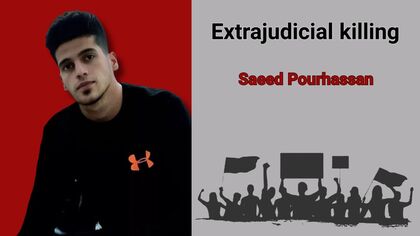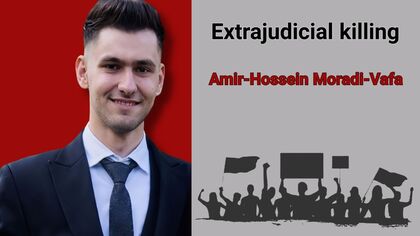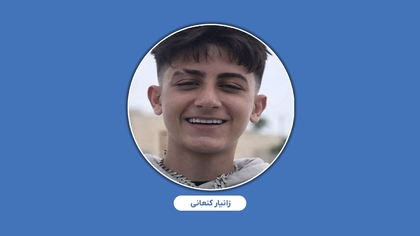U.S. State Dept: Iran should release ailing activists Mohammadi and Kaboudvand
05:52 - 20 July 2012

Kurdpa: In a press statement just hours ago, the US Department of State’s Victoria Nuland called on Iran to release “all political prisoners”, but expressed particular concern for two journalists currently serving sentences for their human rights stances who are reported to be in ill-health.
\"We are concerned by recent reports that Kurdish activist Mohammed Seddigh Kaboudvand and human rights defender Narges Mohammadi are suffering from rapidly deteriorating health while in prison,\" Nuland said, adding that \"both are reportedly in critical condition.”
Mohammadi, age 39 and a mother of two, received international recognition for her campaign against juvenile executions in Iran. Last month, an appeal court in Tehran reduced Mohammadi\'s earlier 11-year jail sentence to six years after finding her guilty on charges of spreading propaganda against the ruling system, acting against national security and for her membership with Iran\'s Defenders of Human Rights Center (DHRC).
As the deputy head of the DHRC, she was a close colleague of the Nobel peace laureate Shirin Ebadi, who presided over the organization. She is the wife of Taghi Rahmani, also a political activist, who has spent a third of his life in jail. Rahmani recently fled Iran in fear of further persecution.
According to rights watch groups reporting on her condition, Mohammadi has developed an undiagnosed epilepsy-like disease since her previous arrest in 2010 when she was kept in solitary confinement in Tehran\'s Evin prison for a month.
Mohammadi\'s arrest has sparked outrage among international human rights groups and organizations. The press watchdog group ReportersWithout Borders has strongly condemned her conviction.
A statement published on the RSF\'s website reads, \"(Mohammadi) was detained in the northern city of Zanjan on 21 April after receiving an intelligence ministry summons and was transferred to Tehran\'s Evin prison to serve a six-year jail sentence.\"
According to the statement, Mohammadi\'s husband - also a fellow journalist - spoke with Reporters Without Borders and said he is “very worried about her deteriorating health.”
Rahmani, who has worked for a number of media outlets since 1981, has also been constantly harassed by the security services and spent a total of 14 years in Iranian prisons.
Speaking to the International Campaign for Human Rights in Iran (ICHRI), a US-based non-governmental organization, Rahmani said: \"Everyone is concerned about our two young children, and I worry a lot about them, too… \"More than the kids, right now I worry about Narges\'s illness. She has muscular paralysis, which is exacerbated under stress and pressure.\"
Kaboudvand, 50, a Kurdish-Iranian, is also being held in the notorious Evin, where many political dissidents continue to be held and where many are believed to have been subjected to torture following the country\'s massive 2009 anti-government uprisings.
He is the former editor of Payam-e Mardon, and founder of Kurdistan Human Rights Organization, and was named “International Journalist of the Year” at the British Press Awards in 2009.
There is also a petition circulating among rights groups and journalists to nominate Kaboudvand for the Nobel Peace Prize.
Kabouvand has been on hunger strike since May 14 in protest at the Iranian authorities\' refusal to grant him permission to visit his sick son, Pejman, who was diagnosed with a rare blood condition and has been in a Tehran hospital for five months, putting the family under immense emotional and financial pressure, rights groups are saying.
Amnesty International, the International Federation for Human Rights (FIDH), and its affiliate, the Iranian League for the Defense of Human Rights (LDDHI) said in a joint statement today that \"the Iranian authorities are responsible for any risks\" to Mohammad Kaboudvand as a result of his ongoing hunger strike.
\"Mohammad Sadiq Kabudvand is a prisoner of conscience, held solely for his journalistic and human rights work and the peaceful exercise of his right to freedom of expression. He should never have been arrested in the first place, and must be released immediately and unconditionally so that he is free to be with his family at this distressing time,\" said Ann Harrison, the deputy director of Amnesty International\'s Middle East and North Africa Program.
Her comments were echoed by Karim Lahidji, the vice president of the FIDH and President of the LDDHI who warned that the responsibility for Kaboudvand\'s health rest on the hands of the Iranian authorities.
\"The Iranian authorities are responsible for any possible risks to Mohammad Kaboudvand\'s life as a result of his continuing hunger strike and his deteriorating conditions,\" he said. \"Under the UN Standard Minimum Rules for the Treatment of Prisoners, the Iranian authorities are obliged to take immediate action to provide urgent medical care to Mohammad Kaboudvand. They must stop further tormenting a father by denying him the right to visit his ailing son.\"
According to International Campaign for Human Rights in Iran, Kaboudvand has been in custody since June 2007, and is serving an 11-year prison term. Kaboudvand has been kept in solitary confinement for 5 months in spite of having suffered a stroke while in custody.
The Kurdish Human Rights Project has also reported that he is being held \"without adequate medical care despite reportedly suffering from serious health problems.\"
Nuland’s statement said the US has “repeatedly called on the Islamic Republic to observe human rights, particularly in its treatment of political opposition and religious minorities.
“Washington calls on Iranian authorities to immediately release all political prisoners and to uphold its own laws and international obligations that guarantee freedom of expression, religion, opinion, and assembly for all citizens,” it read.
According to the activist and human rights site iranrights.org, there have been 26 reported executions in Iran for the month of July, with a total of 288 so far this year. Last year (2011), the government put a total of 652 freedom organization activists and students to death.
JULY 18, 2012BY - By RHONDA PARKER
Source: Examiner.com
\"We are concerned by recent reports that Kurdish activist Mohammed Seddigh Kaboudvand and human rights defender Narges Mohammadi are suffering from rapidly deteriorating health while in prison,\" Nuland said, adding that \"both are reportedly in critical condition.”
Mohammadi, age 39 and a mother of two, received international recognition for her campaign against juvenile executions in Iran. Last month, an appeal court in Tehran reduced Mohammadi\'s earlier 11-year jail sentence to six years after finding her guilty on charges of spreading propaganda against the ruling system, acting against national security and for her membership with Iran\'s Defenders of Human Rights Center (DHRC).
As the deputy head of the DHRC, she was a close colleague of the Nobel peace laureate Shirin Ebadi, who presided over the organization. She is the wife of Taghi Rahmani, also a political activist, who has spent a third of his life in jail. Rahmani recently fled Iran in fear of further persecution.
According to rights watch groups reporting on her condition, Mohammadi has developed an undiagnosed epilepsy-like disease since her previous arrest in 2010 when she was kept in solitary confinement in Tehran\'s Evin prison for a month.
Mohammadi\'s arrest has sparked outrage among international human rights groups and organizations. The press watchdog group ReportersWithout Borders has strongly condemned her conviction.
A statement published on the RSF\'s website reads, \"(Mohammadi) was detained in the northern city of Zanjan on 21 April after receiving an intelligence ministry summons and was transferred to Tehran\'s Evin prison to serve a six-year jail sentence.\"
According to the statement, Mohammadi\'s husband - also a fellow journalist - spoke with Reporters Without Borders and said he is “very worried about her deteriorating health.”
Rahmani, who has worked for a number of media outlets since 1981, has also been constantly harassed by the security services and spent a total of 14 years in Iranian prisons.
Speaking to the International Campaign for Human Rights in Iran (ICHRI), a US-based non-governmental organization, Rahmani said: \"Everyone is concerned about our two young children, and I worry a lot about them, too… \"More than the kids, right now I worry about Narges\'s illness. She has muscular paralysis, which is exacerbated under stress and pressure.\"
Kaboudvand, 50, a Kurdish-Iranian, is also being held in the notorious Evin, where many political dissidents continue to be held and where many are believed to have been subjected to torture following the country\'s massive 2009 anti-government uprisings.
He is the former editor of Payam-e Mardon, and founder of Kurdistan Human Rights Organization, and was named “International Journalist of the Year” at the British Press Awards in 2009.
There is also a petition circulating among rights groups and journalists to nominate Kaboudvand for the Nobel Peace Prize.
Kabouvand has been on hunger strike since May 14 in protest at the Iranian authorities\' refusal to grant him permission to visit his sick son, Pejman, who was diagnosed with a rare blood condition and has been in a Tehran hospital for five months, putting the family under immense emotional and financial pressure, rights groups are saying.
Amnesty International, the International Federation for Human Rights (FIDH), and its affiliate, the Iranian League for the Defense of Human Rights (LDDHI) said in a joint statement today that \"the Iranian authorities are responsible for any risks\" to Mohammad Kaboudvand as a result of his ongoing hunger strike.
\"Mohammad Sadiq Kabudvand is a prisoner of conscience, held solely for his journalistic and human rights work and the peaceful exercise of his right to freedom of expression. He should never have been arrested in the first place, and must be released immediately and unconditionally so that he is free to be with his family at this distressing time,\" said Ann Harrison, the deputy director of Amnesty International\'s Middle East and North Africa Program.
Her comments were echoed by Karim Lahidji, the vice president of the FIDH and President of the LDDHI who warned that the responsibility for Kaboudvand\'s health rest on the hands of the Iranian authorities.
\"The Iranian authorities are responsible for any possible risks to Mohammad Kaboudvand\'s life as a result of his continuing hunger strike and his deteriorating conditions,\" he said. \"Under the UN Standard Minimum Rules for the Treatment of Prisoners, the Iranian authorities are obliged to take immediate action to provide urgent medical care to Mohammad Kaboudvand. They must stop further tormenting a father by denying him the right to visit his ailing son.\"
According to International Campaign for Human Rights in Iran, Kaboudvand has been in custody since June 2007, and is serving an 11-year prison term. Kaboudvand has been kept in solitary confinement for 5 months in spite of having suffered a stroke while in custody.
The Kurdish Human Rights Project has also reported that he is being held \"without adequate medical care despite reportedly suffering from serious health problems.\"
Nuland’s statement said the US has “repeatedly called on the Islamic Republic to observe human rights, particularly in its treatment of political opposition and religious minorities.
“Washington calls on Iranian authorities to immediately release all political prisoners and to uphold its own laws and international obligations that guarantee freedom of expression, religion, opinion, and assembly for all citizens,” it read.
According to the activist and human rights site iranrights.org, there have been 26 reported executions in Iran for the month of July, with a total of 288 so far this year. Last year (2011), the government put a total of 652 freedom organization activists and students to death.
JULY 18, 2012BY - By RHONDA PARKER
Source: Examiner.com



